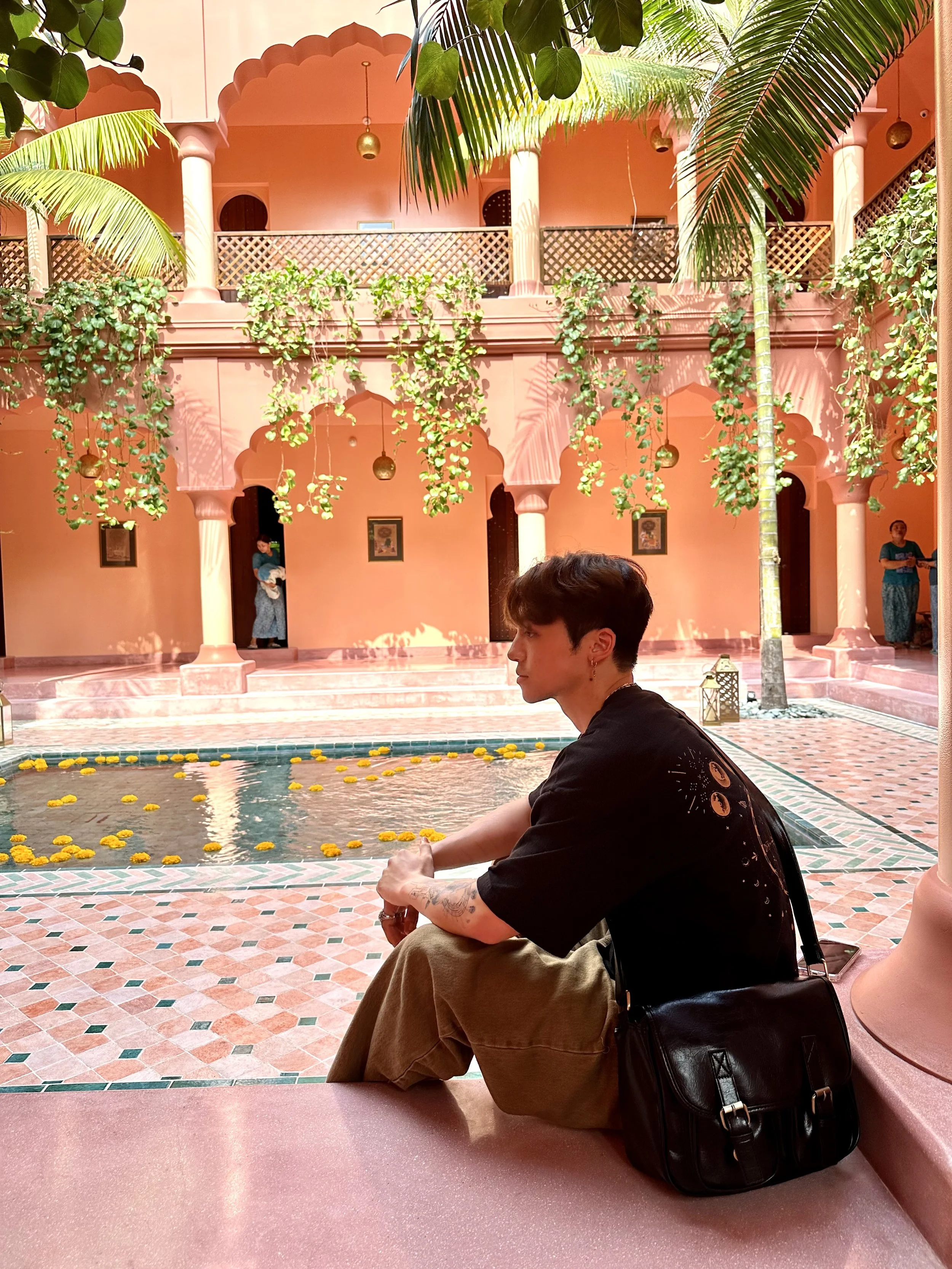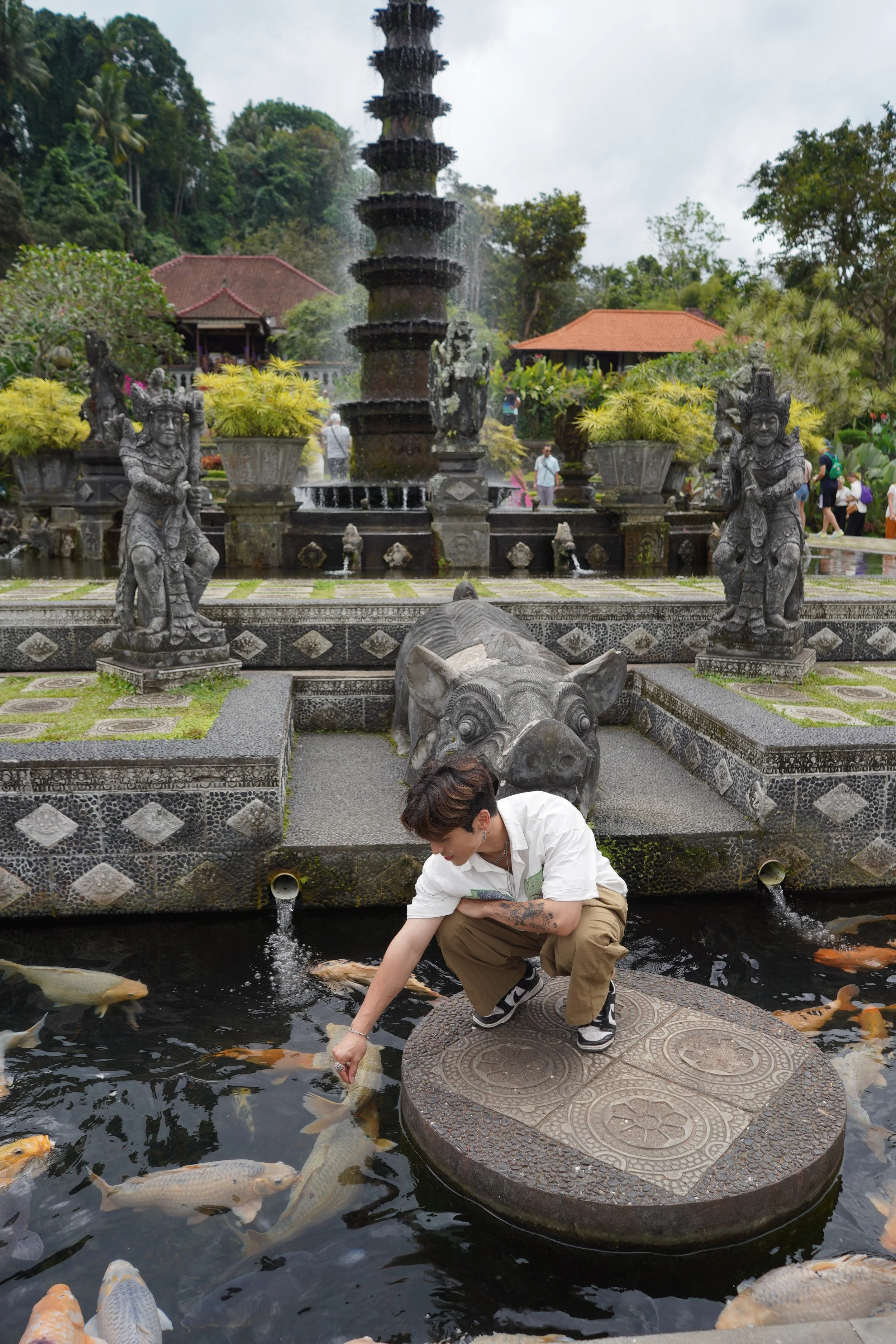Beomhan’s Not Afraid of the Future
In his first interview since becoming an independent artist, the singer reflects on his biggest challenge yet: Believing in himself.
. “I don’t want my fans to think it’s a bad thing to be open about your mental health,” Beomhan says. “I want them to know it’s okay to not be okay.”
For the past three years, thanks to an almost relentless desire to entertain, Beomhan has been one of K-Pop’s most popular trainees. At an incredibly fast pace, he opened a YouTube channel, went on three tours, kept a notebook full of bars which occasionally found its way into music, covered dance challenges on TikTok, and streamed weekly, all of which garnered him millions of fans. Many idols in K-Pop feel insulated by mystery, but never Beomhan. He is always present; ready and willing to engage with you on nearly any level. Perhaps most crucially to his fans who he calls Tiger Cubs, he has always been remarkably accessible.
But after recently departing from his training company, the multi-hyphenate singer, rapper and dancer, is embarking on a new challenge. Who does Beomhan become now that he’s no longer going to debut? The singer is 23 years-old, an age when most of his friends would have recently graduated from college, and at a time when our identities take shape. His next moves are both wide open possibilities and strange uncertainties. “But the future is bright,” he told me warmly as he hung out in a cafe in Seoul, occasionally distracted by a bird outside the window or a loud group of people nearby. We had connected by Zoom, but Beomhan and I had kept in touch since we met in Atlanta a year ago. In him, I found someone who could speak candidly about his aspirations as a trainee. But I was most taken by his vulnerability.
Beomhan became famous because of his candor, which he’s distilled across several social media channels. On TikTok he has over 2 million followers, and his livestreams (both on Twitch and TikTok) regularly draw thousands of fans to hang out with him. Many of Beomhan’s fans see him as an older brother or best friend. That is important because it is this relatability which is interlinked to his popularity.
Watch any Beomhan livestream and you’ll notice almost immediately that the comment section reads like a chaotic group chat. Fans tell him about their day, talk about new music they want to listen to, and trade roasts or jokes.
“You guys wanna listen to SEVENTEEN’s ‘_WORLD’?” Beomhan nearly shouted once on a Twitch stream, referring to a hugely popular K-Pop song. His lives often have this immediacy that is like hanging out with your best friend. On his last livestream he offered a hug to fans “because your favorite streamer can’t.” That streamer is Stray Kids’ Bang Chan.
“That’s why I’m so grateful for the community we have here. I’m here for the fans, and the fans are here for me. The fans are also here for each other,” he told me softly. “One of the reasons I hope to continue to grow this community is because I hope I can continue to give appreciation and support back to as many people as I can.”
It’s the fans who have spent money and time to give Beomhan gifts on tour, to send him supportive messages or to cheer him on as he’s worked to succeed as an artist. When we met last year, Beomhan was in the middle of the biggest tour of his life, and his fans appeared genuinely moved to engage with him in person. While the majority of Beomhan’s fans approached him as if they were old friends, some cried as they spoke to him and shared deeply personal stories. Many told him that he had saved their lives or made them feel less alone. What they didn’t know is just how much they had helped him too.
“I was always an expressive person,” Beomhan said as he sipped on an iced coffee. He was reflecting on perhaps the part of him that is best known for: His ability to tell a good story. “If I’m going through something, you’re probably gonna know. And if I’m happy, I’m going to say I’m happy.”
Beomhan tends to talk really fast, sometimes so quickly that the words get stuck in his mouth as his brain works to catch up. He’s right, too. He’s wildly expressive: throwing his body back to laugh, grabbing his head when he’s distressed, and coming closer to you for dramatic effect. He often nearly wheezes from laughing so hard.
Meeting him for the first time you might mistake him for someone who’s carefree. But growing up, Beomhan’s home life was unsettled. He was raised by parents who had fled China during the country’s One Child Policy and settled in the Brooklyn borough of Coney Island.
“Have you ever been to Coney Island?” Beomhan asked me curiously last year. It wasn’t like the attractions you see on postcards. Beomhan’s Coney Island was gritty, and even dangerous at times. Things weren’t much better at home. As a child, he would listen as his parents argued with one another, their voices rising until they reached a crescendo of shouts and tears. His father did his best to get by, working long hours on construction sites, but times were tough for his family. No one spoke English.
“They aren’t dumb,” he said of his parents. “They just weren’t understanding each other.”
“My mom struggled with depression and she literally never has had anyone to talk to,” Beomhan remembered. “And even if she did have someone to talk to, she wouldn’t say anything.” Watching his mother silently suffer through her pain was hard for Beomhan. He’d often tell her, “If you don’t speak up for yourself, I will.” But Beomhan’s mother never accepted the help. Her suffering, he began to sense, was something that clung to her like a sickness.
I can relate: My mother, too, lives with depression. Once, I told him, she confided in me that she stopped seeing her therapist because all she did was lie to him. Her pain, she felt, shouldn’t override her duties as a wife or mother. I'm still piecing together what this taught me. Who do we become when we’re told our emotions aren’t worth sharing?
Sometimes we deny we feel anything at all, while the anxiety and dread builds, like a weed sprouting underground. I spent years doing that until I broke apart in my early twenties. But sometimes, like Beomhan, we learn to advocate for ourselves from a young age. At home, his parents speak a form of Cantonese that is so rare that many people wouldn’t even know it if they heard it. But at school, he had to learn English on his own. Making friends, too, also took tenacity that he had to harness quickly. This honed a sense of survival that has stayed with Beomhan to this day.
“It was definitely hard feeling everything and having to be tough,” he said of his adolescence. “It was like building two separate people at once.” To persevere, Beomhan had to perfect these two very different sides of himself. “I learned that you could be emotional but you still had to have accountability for your life and not let anything tear you down despite how you feel.”
As he became more famous, Beomhan developed an endurance to deal with the pressures of being a public figure. Fans looked to him for support, but he was still the boy from Coney Island who was trying to figure himself out. He laughed when he said that his fans look to him for comfort because, ironically, he’s depressed, too. So, Beomhan found that simply being honest with his fans brought them closer together.
“It didn’t feel courageous to be so open,” he told me. Until recently, Beomhan hadn’t considered how much his honesty meant to his fans. “But I started thinking about the impact that my voice would have on younger people.” The purpose of this interview, he said, is for his fans to know that they’re not alone in what they’re feeling. “I don’t want them to think it’s a bad thing to be open about your mental health,” he said. “I want them to know it’s okay to not be okay.”
Beomhan told me that he’s never experienced a professional backlash because of his vulnerability, but he has noticed that his openness tends to provoke uncomfortable feelings online. While fans have surrounded him in support, other users on X (Twitter) have made fun of him when he’s cried. It’s been hurtful, he said, to see the people who comment, “Why are you crying? Man up.” But Beomhan bristles at these statements. “It’s not a weakness,” he said defiantly, to be open about your feelings.
Beomhan wondered if many of the people on social media who criticize him for sharing the extent of his depression, which for Beomhan’s privacy I will not detail here, are scared to give themselves the grace to fall apart. Beomhan’s pressured himself to push through this feeling before, even when he was a teenager. “I can’t feel bad for myself just because I’m depressed,” he said. “I know a lot of people gave up and let their situations be their situations, where they’d give into their depression.” So, he’s continued to push himself to be a little more open, piece by piece, year by year. Eventually, he said, he decided to speak up.
“I’ve been very lucky in my life to be surrounded by good friends,” he said. “If you say something and you’re around a good support system, you feel more encouraged to speak more.” But he empathizes with people who were told to repress their feelings. “Some people feel shut in and like they can’t speak up for themselves,” he said quietly. “And for those people, I pray for them and I hope one day they can realize that it’s okay.”
Beomhan in China
There’s a TikTok I love of Beomhan dancing to Doja Cat’s smash single “Paint the Town Red”. He’s in his bedroom dressed in a black tank top with posters behind him plastered on the wall .A sly look is on his face as he nails the chorus’ choreography. “Bitch, I said what I said/ I’d rather be famous instead,” Doja raps half-jokingly, mocking the public’s criticism that she only cares about fame. “I don’t care, I’ll paint the town red.” Then she cuts deeper and projects the things we think about her, “She’s a devil/ She’s a bad little bitch/ She’s a rebel.” Ironically, “Paint the Town Red” is Doja’s response to a major backlash from fans when she said she doesn’t love them, but Beomhan makes the song his own. Do you think he’s too thirsty for success? He probably does too.
Beomhan made no secret that he wanted to be the biggest K-Pop star in the world. He said that to me explicitly in our first interview. But as he’s had time to reflect this year, Beomhan is seeing success as no different than the coin toss he threw to decide whether he would move to Korea in 2020. Sometimes you land on heads and other times, you hit tails. But Beomhan is still gambling and bartering to reach his goals.
“Success is like rolling a dice and sometimes you just gotta keep rolling till you hit the six” he said by way of an analogy. “I’ve spent years rolling the dice.” He paused and looked me in the eyes. “I feel like I’ve been rolling more than anyone in this world.”
For a while, though, Beomhan thought about leaving entertainment all together. Maybe he’d go to college, start a business, and just live anonymously. But his fans have reminded him that there’s more work to be done. And that his voice is important.
“The last two months have made me realize I matter and that there are people waiting on me still,” he said. “I feel this responsibility to still be there for people.” He continued, “I promise my fans will be entertained and Beomhan isn’t going away anytime soon.”
Part of that is new music, which Beomhan is coy about sharing too much, only offering that it will likely be different than the music fans are used to hearing from him. If you follow his Spotify account and listen to his playlists, though, you might see a direction.
“I still love the songs I made. I’m not one of those people who says, ‘I hate my previous music!’” he said jokingly. “The songs that I made in the past were very personal, but it’s not totally representative of the music I want to make.” He stopped himself before he could say more and dismissed any more explanation. “Just look forward to it. It’ll be good, I promise.”
Beomhan’s rapidly pursuing, in characteristic form, a number of passions: acting, music, writing, and he’ll continue to livestream. What he’s been most moved by is seeing that his fans will continue to support him, even if he’s not in K-Pop. “I have been feeling a lot of love, and I appreciate it,” he said. When I asked if he had a message he wanted his fans to hear, he grew quiet. “Thank you all for supporting me and letting me know that you’re with me,” he reflected. “I hope I can give back in the same way.”
There is no real strategy at play here, he insisted. Like anyone, Beomhan is trying to give himself grace and he wants to be a positive example to others. He’s aware that he has young fans who watch him, and he hopes that his mistakes can help them. “I just see myself as human and I allow myself to be human,” he explained. “I hope people can see I’m just like them and they’re human just like I am. Like me, I hope they can push through their struggles, too.”
He thought about it for a moment. Maybe the most fragile part about being human is that sometimes our dreams can break our hearts or change our lives. There’s such high stakes in being understood and doing what we love. The most important thing, Beomhan told me, is that he continues to dream.
“I think what I’ve learned is that I love myself,” he said, “and part of what loving myself means is doing what’s best for myself.”





